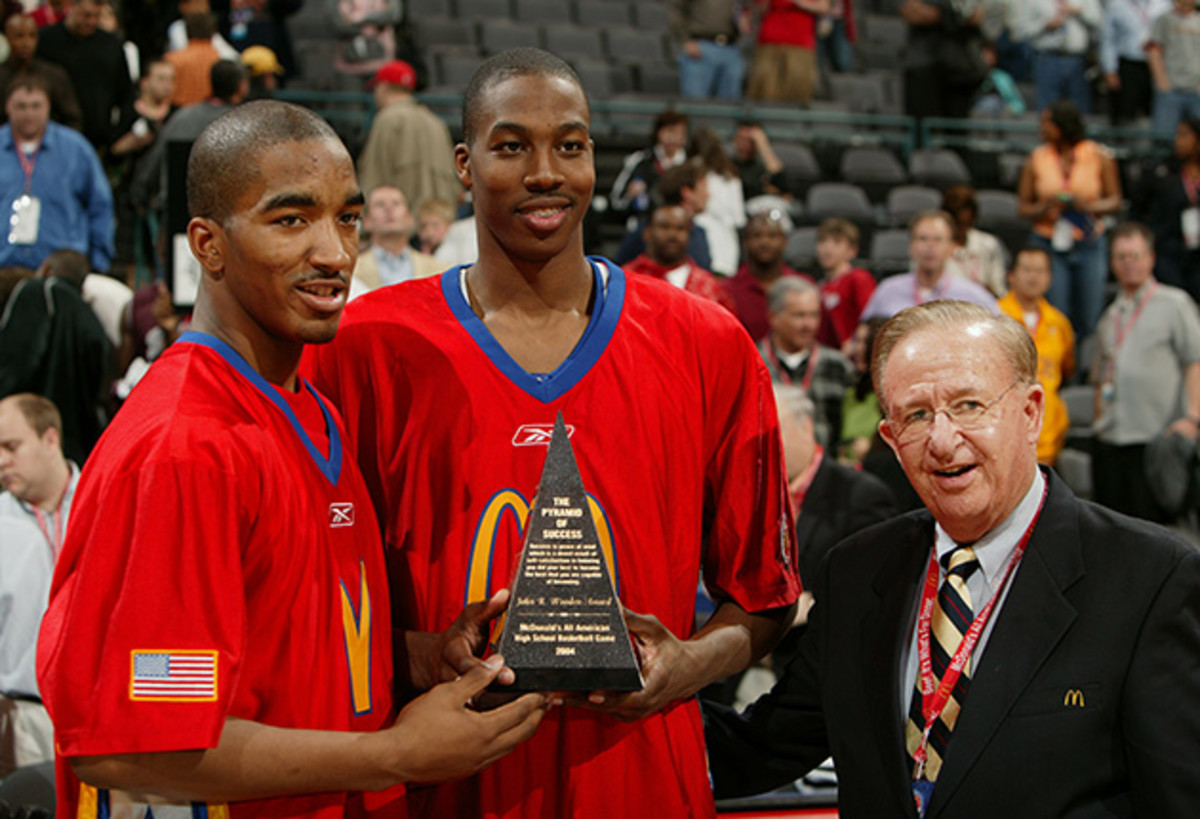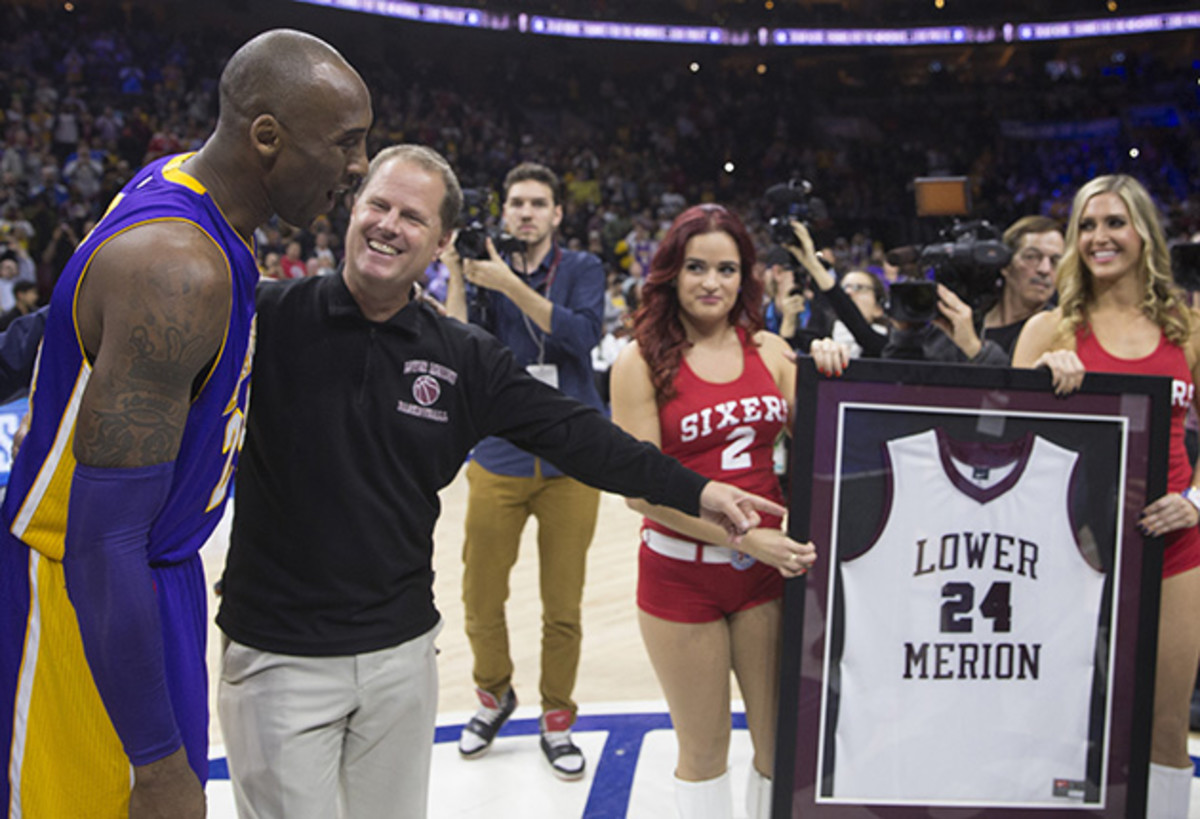Preps to pros: Was Kevin Garnett the best prospect to make NBA jump?

Future Hall of Famer Kevin Garnett is reportedly contemplating retirement ahead of his 22nd season, according to NBA.com’s Steve Aschburner. The Big Ticket, who won an NBA championship in 2008 with the Boston Celtics and league MVP honors in 2004 with the Minnesota Timberwolves, is among the best prep-to-pro NBA players of all-time.
Drafted No. 5 overall by the T-Wolves in 1995 out of Farragut Career Academy in Chicago, Illi., KG went on to become one of the game’s most accomplished big men. His skills have diminished significantly at 40 years old with more than 50,000 regular season minutes on the odometer, but he’s one of the last remaining relics of stars drafted in the 1990s following the retirement of both Kobe Bryant and Tim Duncan. While Garnett’s decision to play another year seems up in the air at this juncture, his legacy has already been solidified.
PointAfter, a sports data visualization site that’s part of Graphiq, wanted to take a look back at all the players who, like Garnett, were drafted straight out of high school. We limited our scope to the prep-to-pros players drafted since the NBA/ABA merger. Interestingly, the 39 prep-to-pro players narrowed down to a clear-cut top five—starting with one of the NBA’s biggest what-ifs.
More from PointAfter (Graphiq network): All-Time Rosters for Every NBA Franchise | Re-Picking the 1996 NBA Draft | The Best NBA Team Seasons in History
5. Tracy McGrady
Career Win Shares:97.3
Career Accolades:2x All-NBA First Team, 3x All-NBA Second Team, 2x All-NBA Third Team, 7x All-Star, 2x Scoring Champ, NBA Most Improved Player (2001)
At his peak, Tracy McGrady was an all-time great. Few players in the league could compare to the young star when he broke out with the Orlando Magic following a three-year stint with the Toronto Raptors to begin his NBA career.
Tracy McGrady's Short-Lived Peak as an Elite Scorer | PointAfter
He led the league in scoring in 2003 and 2004 with the Magic. During the 2002–03 season, McGrady averaged 32.1 points, 6.5 rebounds, 5.5 rebounds and 1.7 steals while shooting 45.7% from the field and 38.6% from three-point range—video-game-like numbers.
Unfortunately for T-Mac, various injuries derailed his chances at finishing as one of the game’s best ever.
After he left Orlando, recurring back spasms hampered him throughout his time with the Houston Rockets. In May 2008, McGrady underwent arthroscopic surgery on his left knee and left shoulder. The campaign following those two off-season surgeries jump-started the superstar’s rapid decline. He played just 35 games in 2008–09 before announcing that he would undergo season-ending microfracture surgery on the same left knee.
Despite playing without McGrady during that year’s playoffs, the No. 5 seed Rockets advanced past the first round by dispatching the No. 4 seed Portland Trail Blazers in six games. This technically marked the first time in McGrady’s career that he advanced beyond the first round of the postseason, because T-Mac was still on the roster—but being sidelines brings about an asterisk. (McGrady’s detractors often used his inability to advance beyond Round 1 to strengthen their argument.)
McGrady played in just three seasons thereafter (plus the 2013 playoffs with the San Antonio Spurs) and never averaged double-digit points again.
• Where would Rubio shine? | Riley toes line between winning, misery
The End of T-Mac's Career Was Ravaged by Injuries | PointAfter
But even though McGrady never experienced any playoff success to speak of and was out of the league before his 35th birthday, he still managed to establish himself as the fifth-best prep-to-pro player since the NBA/ABA merger.
His elite peak in Orlando, when he averaged 12.05 win shares per season, helped prop up his overall standing. Fans can only wonder what would have been if McGrady’s back and knees didn’t betray him.

4. Dwight Howard
Career Win Shares:113.2
Career Accolades:5x All-NBA First Team, All-NBA Second Team (2014), 2x All-NBA Third Team, 4x All-Defensive First Team, All-Defensive Second Team (2008), 3x Defensive Player of the Year, 8x All-Star, All-Rookie First Team, 5x rebounding leader, 2x blocks leader, Slam Dunk Champion (2008)
Dwight Howard certainly has his fair share of detractors—both for his decision to force his way out of Orlando and for a perceived indifference to winning. With that being said, it’s impossible to overlook Howard’s accolades.
One of the best defensive big men in league history, Howard has won the Defensive Player of the Year award three times. Only Dikembe Mutombo and Ben Wallace are ahead of him as the NBA’s sole four-time DPOY winners.
NBA Players Who've Won Multiple DPOY Awards | PointAfter
Howard is far removed from his age-23 season, when he guided Orlando to the 2009 NBA Finals under head coach Stan Van Gundy. He hasn’t averaged two blocks or more since 2012–13 and his scoring output has dipped for three consecutive seasons.
It Seems Dwight Howard Already Hit His Peak | PointAfter
After signing with the Atlanta Hawks this off-season, Howard told the Atlanta Journal-Constitution’s Chris Vivlamore, “I’m very motivated. I’m really (ticked) off about last season. I’m looking forward to coming back with a different mentality.”
Whether that “different mentality” will bring about a resurgence from Howard back in his birthplace remains to be seen. Nevertheless, the former No. 1 overall prep-to-pro has undoubtedly been one of the best players ever to straight from high school to the pros.
• Stoudemire retires as a Knick | Durant finds peace as center of attention
3. Kevin Garnett
Career Win Shares:191.4
Career Accolades:NBA Champion (2008), MVP (2004), 4x All-NBA First Team, 3x All-NBA Second Team, 2x All-NBA Third Team, 9x All-Defensive First Team, 3x All-Defensive Second Team, Defensive Player of the Year (2008), 15x All-Star, All-Star Game MVP (2003), All-Rookie Second Team, 4x rebounding leader
Now serving as a sage veteran for the team that drafted him out of high school in 1995, KG’s career is winding down. He started all 38 games he played in for Minnesota last season before injuries kept him sidelined.
And while he only played 14.6 minutes per contest, he was still a huge net positive for the T-Wolves’ defense when he was on the court. As a coach on the floor for youngsters like Karl-Anthony Towns and Andrew Wiggins, Garnett is still providing value at age 40.
Minnesota's Opponents With KG On/Off Court (2015-16) | PointAfter
But back in his day, he was an elite two-way power forward. Before KG was traded to the Boston Celtics to form a championship-caliber Big Three with Paul Pierce and Ray Allen, Garnett averaged approximately 20 points and 11 rebounds per contest during his first 12 NBA seasons in Minnesota. His consistency over that stretch was matched by remarkable durability, as Garnett missed only 25 regular season games over the course of his first dozen years in the league
He’s a surefire Hall of Famer, but only checks in as the third-best high school product.

2. Kobe Bryant
Career Win Shares:172.7
Career Accolades:5x NBA Champion, MVP (2008), 2x Finals MVP, 11x All-NBA First Team, 2x All-NBA Second Team, 2x All-NBA Third Team, 9x All-Defensive First Team, 3x All-Defensive Second Team, 18x All-Star, 4x All-Star Game MVP, 2x Scoring Champ, All-Rookie Second Team, Slam Dunk Champion (1997)
Although Kobe Bryant finished his career with nearly 20 fewer win shares compared to The Big Ticket, we couldn’t overlook the Mamba’s expansive career accolades. With five championship rings, 11 All-NBA First Team nods and nine All-Defensive First Team selections, Bryant retires as the most accomplished shooting guard not named Michael Jordan.
Interestingly, Bryant was selected with the lowest pick of any prep-to-pro in our top five. The Charlotte Hornets took Bryant with the No. 13 overall selection back in 1996 before trading him to the L.A. Lakers in exchange for Vlade Divac. “Vino” promptly went on to play 20 seasons, scoring 33,643 career points—good for third on the NBA’s all-time scoring list.
The NBA's All-Time Scoring Leaders | PointAfter
The lifelong Laker once scored 81 points in a single game and holds the record for the most 50-plus point games in a single season with 10 (during the 2006–07 campaign).
Bryant’s a shoo-in for the Hall of Fame, but a disastrous, injury-riddled end to his NBA tenure helped open the door for the guy at No. 1.
• Bryant's best moments through the years | LeBron's dreams come true
1. LeBron James
Career Win Shares:192.5
Career Accolades:3x NBA Champion, 4x MVP, 3x Finals MVP, 10x All-NBA First Team, 2x All-NBA Second Team, 5x All-Defensive First Team, All-Defensive Second Team (2014), 12x All-Star, Rookie of the Year (2004), Scoring Champion (2008)
For those who may think it’s premature to deem LeBron James the best prep-to-pro NBA player of all-time over Bryant, note that the three-time Finals MVP and four-time league MVP has nearly 20 more win shares by comparison and is still just 31 years old.
King James has plenty of time to build on his legacy, but there’s clout to the argument he’s already surpassed Bryant. Yes, Kobe has the advantage in terms of championship rings (five to three), but LeBron was the undisputed best player on all three of his title-winning squads. The Lakers of the early 2000s had Shaquille O’Neal at his zenith.
Outside of raw championships, there truly aren’t many metrics pointing in Bryant’s direction.
LeBron James vs. Kobe Bryant (Career Averages) | PointAfter
Save for free throw percentage, James is ahead of Bryant in every statistical category by career averages. That narrative extends into the postseason as well, with Bryant taking the lead in three-point percentage (33.1% against 32.1%). James’s true shooting percentage, offensive and defensive box plus-minus and value over replacement player stats are all superior to Bryant’s.
Additionally, James boasts a total points added figure—a metric by NBAMath.com that measures a player’s effectiveness on offense and defense on a per-possession basis—of 8,349.03 (regular season plus playoffs). By comparison, Bryant has 4,361.47 TPA.
James has always been a transcendent, once-in-a-generation star, but a herculean effort to come back in the 2016 NBA Finals and dispatch the 73-win Warriors has brought back a lot of the respect he rightfully deserved.
Let’s just say that if James spent a year in college instead of making the leap to the NBA, he could have even made Arizona State a tournament favorite.
